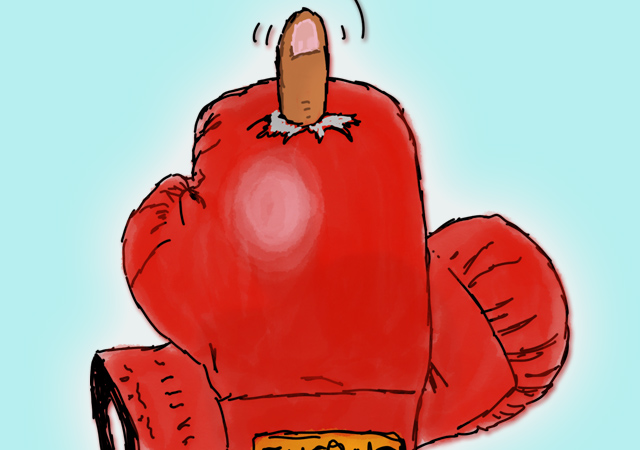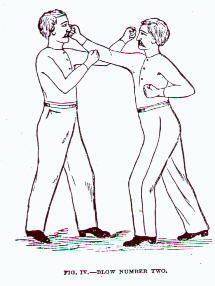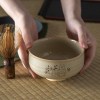
Ioka and friends declare: “Tattoo culture is best.”
In Japan there are lots of traditional television programming during the New Year holidays. The song contest Kohaku is the most prominent but many people also look forward to shows such as Gackt defends his unbeaten streak in Entertainer Rating Check. And for sports fans, there’s always a highly anticipated boxing card lined up for New Year’s Eve.
This year saw a World Boxing Organization super flyweight match up between first class fighters Kazuto Ioka and Kosei Tanaka. Billed as the “match of the year,” it lived up to the hype with both boxers trading precision blows well into the eighth round when Ioka knocked out Tanaka while he was still standing.
▼ Highlights from the match
It was really a great fight, but also one marred with controversy. Not because of any moves performed in the ring, but because we could see Ioka’s tattoos. This is a violation of Article 86 of the Japan Boxing Commission (JBC) rules that states: “A person with a style that makes the audience feel uncomfortable…cannot participate in matches.” The rule also specifically mentions “tattoo” as an example of such a style.
This might come as a shock to many, since you’d be hard pressed to find a boxer who doesn’t have a tattoo or seven, but it is how they operate in Japan where the body art still holds stubborn connections with organized crime. However, the JBC doesn’t even bother trying to enforce the rule on fighters who come in from overseas, and only binds Japanese boxers to it.
One of the JBC’s rivals, the Japanese MMA organization Rizin, does not prohibit tattoos outright. However, when showing their own New Year’s full card extravaganza they didn’t air fights with tattooed fighters on broadcast TV. It stands to reason, as guys trying to punch each other in the face is just good clean fun, but put tattoos on those guys? Well, I can’t even wrap my head around that…
In order to be allowed in the ring and on terrestrial TV, tattooed Japanese fighters must either put tape over the ink or conceal it with make up. Actually, if you watch the fight it’s easy to see that the tats on Ioka’s arms start off very faint, but become more apparent as the match progresses, suggesting his makeup simply wore off.
▼ For comparison, here are scenes of a 2019 match between Ioka, whose ink is almost invisible, and a heavily tatted Aston Palicte from the Philippines
Nevertheless, it is still seen as a violation of the rules and the JBC is currently investigating the case. However, before a judgment was released Ioka (pictured center below) released the following statement.
▼ “Tattoo culture is the best”
タトゥー文化最高 pic.twitter.com/YqedR2uDby
— 平本蓮 REN HIRAMOTO (@renhiramotoXX) January 19, 2021
This tweet was actually posted on the account of tattooed MMA fighter Ren Hiramoto who is sitting left of Ioka and also extending his middle digit, while Ioka proudly displays his ink sleeves and flips the bird at the same time. Hiramoto has been an outspoken critic of the JBC rule, calling the organization “crap” for continuing it.
It should be noted that in Japan the middle finger doesn’t carry quite the same venom that it does in some other countries, so the severity of this image it still being considered. In fact, one could even argue that he was just saying “brother” in Japanese sign language.
Whatever the case may be, it is still awkward timing as mere hours before the tweet was posted, the JBC announced that Ioka was nominated as their “Boxer of the Year” and his match against Tanka was also up for “Match of the Year” at their 2020 annual awards.
While people outside of Japan would probably support his protest of an obsolete rule, more than a few comments in Japan criticized Ioka’s behavior.
“Is he stupid? Does he understand what the middle finger means?”
“That’s a shame. If his tattoo was cool I might support him, but it isn’t.”
“That match against Tanaka was boxing at its purest. Why is he making it hard to defend him?”
“Rules are what makes boxing. Otherwise, it’s just a fight. Ioka should leave Japan if he doesn’t like it.”
“He gives people with tattoos a bad name.”
“These guys are the reason Japanese people don’t get tattoos. Who wants to be like them?”
“Sorry, tattoo culture is not the best.”
Granted, I could probably make a solid case that BBQ culture is better than tattoo culture, if not the best in its own right, but I won’t fault these men for taking pride in their fashion. The comment that rules are what make organized sports “organized” is also valid, but that doesn’t mean there should be arbitrary rules for rules’ sake either.
If that’s the case, then why not go right back to basics and demand all fighters sport curly handlebar mustaches and buttoned undershirts?
Actually, the more I think about that, the more I like it.
▼ “Ho ho my word, Rutherford! You gave my belfry a jolly-good dusting there.”

Ioka’s punishment by the JBC for giving everyone an eyeful of his tattoos is to be announced on 22 January. He is expected to receive the minimum penalty of a “strict warning,” but there’s a possibility his middle finger could land him in the more severe tiers which include “a reprimand,” “a fine,” “forfeiting the match,” “a suspended license,” or “a permanently suspended license.”
As for the JBC revising its policy, it took some Japanese hot springs centuries to begin allowing people with tattoos, so I wouldn’t hold my breath.
UPDATE: Between the writing and publishing of this article, Ioka was officially given a “strict warning” by the JBC for revealing his tattoos in the New Year match
Source: Daily Shincho, Tokyo Sports (1, 2), Twitter/@ren__k1, Hachima Kiko
Top image: ©SoraNews24
● Want to hear about SoraNews24’s latest articles as soon as they’re published? Follow us on Facebook and Twitter!

 Japanese lawyer comments on legality of tattoo ban at hot springs, netizens share thoughts too
Japanese lawyer comments on legality of tattoo ban at hot springs, netizens share thoughts too Japanese government encouraging hot springs to ease tattoo restrictions
Japanese government encouraging hot springs to ease tattoo restrictions Government begins study into tattoo bans in public baths
Government begins study into tattoo bans in public baths Japanese Self-Defense Force mulls removing its ban on tattoos
Japanese Self-Defense Force mulls removing its ban on tattoos Solaniwa Onsen: Kansai’s largest hot spring theme park is also one of its most beautiful
Solaniwa Onsen: Kansai’s largest hot spring theme park is also one of its most beautiful Foreigner’s request for help in Tokyo makes us sad for the state of society
Foreigner’s request for help in Tokyo makes us sad for the state of society Japanese-style accommodation at the new Premium Dormy Inn hotel in Asakusa will blow your mind
Japanese-style accommodation at the new Premium Dormy Inn hotel in Asakusa will blow your mind Seaside scenery, history, and so many desserts on Yokohama’s Akai Kutsu【Japan Loop Buses】
Seaside scenery, history, and so many desserts on Yokohama’s Akai Kutsu【Japan Loop Buses】 Red light district sushi restaurant in Tokyo shows us just how wrong we were about it
Red light district sushi restaurant in Tokyo shows us just how wrong we were about it Japan’s summertime towelket pillowcases are even better with the addition of Ghibli stars【Photos】
Japan’s summertime towelket pillowcases are even better with the addition of Ghibli stars【Photos】 Japanese teacher shares surprising reason why the kanji for crow has one less line than bird
Japanese teacher shares surprising reason why the kanji for crow has one less line than bird Mikado Coffee is a 76-year-old coffee chain with a major celebrity connection
Mikado Coffee is a 76-year-old coffee chain with a major celebrity connection Studio Ghibli adds magic to your matcha with new tea ceremony whisk and bowl
Studio Ghibli adds magic to your matcha with new tea ceremony whisk and bowl The results are in! One Piece World Top 100 characters chosen in global poll
The results are in! One Piece World Top 100 characters chosen in global poll Anime girl English teacher Ellen-sensei becomes VTuber/VVTUber and NFT
Anime girl English teacher Ellen-sensei becomes VTuber/VVTUber and NFT McDonald’s new Happy Meals offer up cute and practical Sanrio lifestyle goods
McDonald’s new Happy Meals offer up cute and practical Sanrio lifestyle goods Japanese ramen restaurants under pressure from new yen banknotes
Japanese ramen restaurants under pressure from new yen banknotes French Fries Bread in Tokyo’s Shibuya becomes a hit on social media
French Fries Bread in Tokyo’s Shibuya becomes a hit on social media New private rooms on Tokaido Shinkansen change the way we travel from Tokyo to Kyoto
New private rooms on Tokaido Shinkansen change the way we travel from Tokyo to Kyoto Tokyo Tsukiji fish market site to be redeveloped with 50,000-seat stadium, hotel, shopping center
Tokyo Tsukiji fish market site to be redeveloped with 50,000-seat stadium, hotel, shopping center Japanese city loses residents’ personal data, which was on paper being transported on a windy day
Japanese city loses residents’ personal data, which was on paper being transported on a windy day Beautiful Ghibli sealing wax kits let you create accessories and elegant letter decorations【Pics】
Beautiful Ghibli sealing wax kits let you create accessories and elegant letter decorations【Pics】 Secret Kitchen bento serves Japanese flowers, birds, wind and moon in a box, but is it worth it?
Secret Kitchen bento serves Japanese flowers, birds, wind and moon in a box, but is it worth it? New definition of “Japanese whiskey” goes into effect to prevent fakes from fooling overseas buyers
New definition of “Japanese whiskey” goes into effect to prevent fakes from fooling overseas buyers Our Japanese reporter visits Costco in the U.S., finds super American and very Japanese things
Our Japanese reporter visits Costco in the U.S., finds super American and very Japanese things Studio Ghibli releases Kiki’s Delivery Service chocolate cake pouches in Japan
Studio Ghibli releases Kiki’s Delivery Service chocolate cake pouches in Japan All-you-can-drink Starbucks and amazing views part of Tokyo’s new 170 meter-high sky lounge
All-you-can-drink Starbucks and amazing views part of Tokyo’s new 170 meter-high sky lounge More foreign tourists than ever before in history visited Japan last month
More foreign tourists than ever before in history visited Japan last month New Pokémon cakes let you eat your way through Pikachu and all the Eevee evolutions
New Pokémon cakes let you eat your way through Pikachu and all the Eevee evolutions Disney princesses get official manga makeovers for Manga Princess Cafe opening in Tokyo
Disney princesses get official manga makeovers for Manga Princess Cafe opening in Tokyo Sales of Japan’s most convenient train ticket/shopping payment cards suspended indefinitely
Sales of Japan’s most convenient train ticket/shopping payment cards suspended indefinitely Sold-out Studio Ghibli desktop humidifiers are back so Totoro can help you through the dry season
Sold-out Studio Ghibli desktop humidifiers are back so Totoro can help you through the dry season Japanese government to make first change to romanization spelling rules since the 1950s
Japanese government to make first change to romanization spelling rules since the 1950s Ghibli founders Toshio Suzuki and Hayao Miyazaki contribute to Japanese whisky Totoro label design
Ghibli founders Toshio Suzuki and Hayao Miyazaki contribute to Japanese whisky Totoro label design Doraemon found buried at sea as scene from 1993 anime becomes real life【Photos】
Doraemon found buried at sea as scene from 1993 anime becomes real life【Photos】 Tokyo’s most famous Starbucks is closed
Tokyo’s most famous Starbucks is closed One Piece characters’ nationalities revealed, but fans have mixed opinions
One Piece characters’ nationalities revealed, but fans have mixed opinions We asked a Uniqlo employee what four things we should buy and their suggestions didn’t disappoint
We asked a Uniqlo employee what four things we should buy and their suggestions didn’t disappoint Korean tattoo artist’s small, simple, stylish “line tattoos” change our impression of getting inked
Korean tattoo artist’s small, simple, stylish “line tattoos” change our impression of getting inked Japanese freehand tattoo artist’s work ranges from bloody & erotic to delicate & beautiful
Japanese freehand tattoo artist’s work ranges from bloody & erotic to delicate & beautiful Onsen in Nagano will now welcome foreigners with tattoos, as long as they patch ’em up
Onsen in Nagano will now welcome foreigners with tattoos, as long as they patch ’em up Big win for tattoo artists: Japan’s Supreme Court rules medical licenses aren’t necessary
Big win for tattoo artists: Japan’s Supreme Court rules medical licenses aren’t necessary No digital ink here – Yokohama tattoo parlor churning out amazing anime art
No digital ink here – Yokohama tattoo parlor churning out amazing anime art U.S. college student learns the hard way to get your Japanese kanji tattoo checked by an expert
U.S. college student learns the hard way to get your Japanese kanji tattoo checked by an expert Tattooed Japanese woman suing nursing school after being suspended because of her ink
Tattooed Japanese woman suing nursing school after being suspended because of her ink Family cheated out of 54 million yen by man impersonating Japanese rock star for three years
Family cheated out of 54 million yen by man impersonating Japanese rock star for three years “Is Japan racist?”: New video humorously confronts long-standing question
“Is Japan racist?”: New video humorously confronts long-standing question Kewpie dolls found in Asakusa have the face of an angel, the bottom of a brothel owner
Kewpie dolls found in Asakusa have the face of an angel, the bottom of a brothel owner Chef at top Tokyo sushi restaurant wins lawsuit after being fired for maybe having a tattoo
Chef at top Tokyo sushi restaurant wins lawsuit after being fired for maybe having a tattoo Check out these amazing Ghibli-inspired tattoos
Check out these amazing Ghibli-inspired tattoos Love hot springs and tattoos? You won’t want to miss this onsen paradise near Tokyo!
Love hot springs and tattoos? You won’t want to miss this onsen paradise near Tokyo! Studio Ghibli tattoos feature our favourites from Totoro, Spirited Away and Howl’s Moving Castle
Studio Ghibli tattoos feature our favourites from Totoro, Spirited Away and Howl’s Moving Castle Kanji T-shirt seen on U.S. TV show makes Japanese viewers giggle
Kanji T-shirt seen on U.S. TV show makes Japanese viewers giggle
Leave a Reply